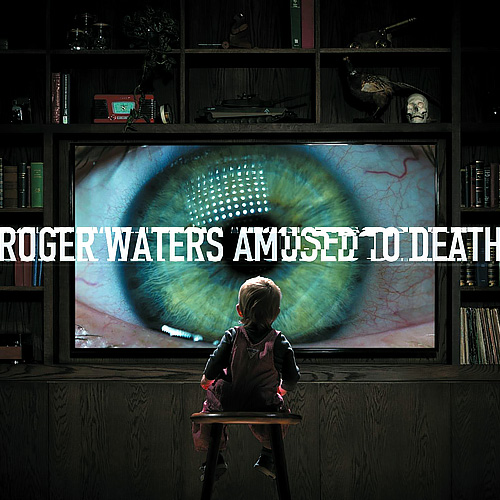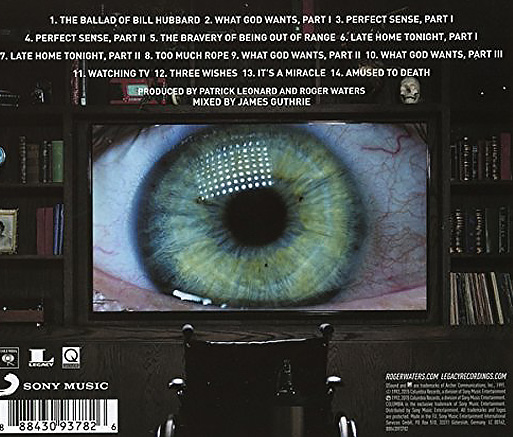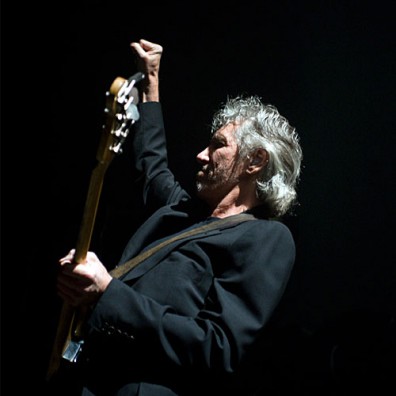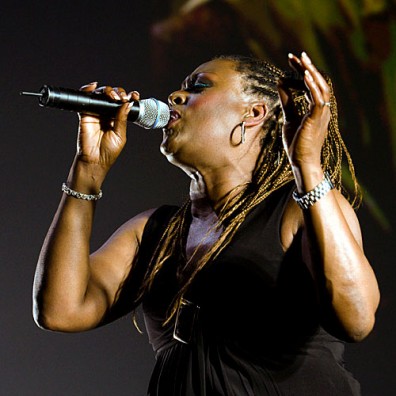Roger Waters on Amused To Death
To celebrate Roger Waters’ moving and highly relevant album AMUSED TO DEATH, we are revisiting a rare Roger Waters interview where he talks about the album - one of my best 100 of all time. It is also an album that is particularly relevant at this time…
The title of the album reminds me of Neil Postman’s book. So, was it the basic idea?
The idea ‘no’, the title ‘yes’. I stole the title from that book, because I loved the title. I like the book very much. This is what I thought, it was very interesting - but the title I loved. So I stole it.
So, what’s the basic idea of the album?
Well, it characterises this gorilla watching TV, and the gorilla is a metaphor for the human race, or for human beings. The album is based upon my response to TV of the last few years.
So, do you watch to TV sometimes?
Recently no, but I was in the habit of watching TV from time to time. I’ve been in the United States for the last eight or nine months where TV is almost unwatchable, unless you’re interested in American football. But the sport also is almost unwatchable, because of the interruptions. They’re so irritating… I’ve never watched an enormous amount of TV, but, however a number of songs from this record are based on my response to specific bits of news, or documentary stuff I’ve seen. But the beginning of the idea of the album came from the song ‘Perfect Sense Part 1′. The image of the monkey comes from the opening shot of ‘2001 - Space Odyssey”, the Stanley Kubrick movie. The chimpanzee is not a chimpanzee, but the early man, if you like, who discovers the bone. And then he can use this bone as a weapon. And that song precedes through a brief history of the human race, until we find ourselves returning to the Garden of Eden at the end of this song, to have another war.
It’s a conceptual album, isn’t it? You like doing concept albums?
Yes, that is my style.
Why? Is it boring for you to do an album - just one song after another - what’s the reason for that?
I can explain it and I’m not sure whether I should either. We don’t choose the work that we do - the work chooses us. I think most people who paint pictures that are interesting, or make music that is interesting, tend to be in contact with something which chooses them rather than the other way around. So, normally, if you’d say ‘well, now I’m going to write a song about the war in the gulf’ it’s likely that it will be boring, because it gets in the pedantry of the approach. So, it’s always been more interesting to me to produce a work that starts and goes through a series of songs that have a relationship - one with the other - and then has a middle and finally has an end, than to do single songs. I don’t know why.”
There are some interesting musicians on ‘Watching TV’…
Yeah, those are a small group of Chinese musicians that call themselves ‘The Peking Brothers’. I believe, they ‘escaped’ from the National Peking Orchestra when they were in London a few years ago. There’s Chinese instruments, lute, a bass and a girl singing, as well. But also more interestingly: in the middle of the piece, after “I grieve for my sister”, you hear a girl’s voice in Chinese, which was on a tape that was smuggled out after the Tiananmen Square massacre from one of the leaders of the student demonstrators there. The whole thing is called ‘Waiting for Our Executioners’ and the bit that I’ve got on the record is the end of her tape, and she says: “People in China, do not forget, do not forget the children who died for you. Long live the Republic!” It’s really a moving thing.
You’re singing together with Don Henley. So, how was it, working with him together? Is he a friend of yours?
He’s a friend of a friend of mine. The disc jockey on Radio Kaos is a friend of Don’s. And he’s been trying to get us together. He felt we are like-minded people. I thought that this song would work with two male voices. I asked him first whether he’d be delighted to and he said ‘fine’. So, I played him the song and he liked it and came in the studio and we did it in a session.
It ’s the first album after five years, after the Kaos album. Did you work for five years on that album?
No, I’ve done other things in the meantime. I wrote the music for an opera which is about the French Revolution. And I did one or two other things.
How do you work when you compose an album? Do you write first the lyrics, or do you compose first the music?
It depends. It varies a lot. Recently, I’ve moved more and more towards a technique, whereby having been moved by something enough for the idea for a song to form in my mind. I will then record a demo of some music. When I feel that the lyrics may be ready to appear I will go into the studio and put the tape on. And I put the headphones on and stand in front of the microphone while the engineer plays the tape. And when the moment comes, when the song should start, I sing, with nothing written down on paper. And sometimes I get 3-4-5-6 line out, straight away. Some of it, of course, is rubbish - and then I’ll go back and drop in a record of what I’ve done and build the song up that way. When the mood is right sometime, I can get a whole song in about half an hour, 40 minutes, so it is very efficient. But also it takes the hurry out of the writing, and it reduces the amount of craft and increases the connection with whatever the muse is that enables me to write songs in the first place.
|
|

|

Rise Against |
LATEST GALLERY IMAGES

While Netanyahu Speaks 
In Whose Name? |
|
|





